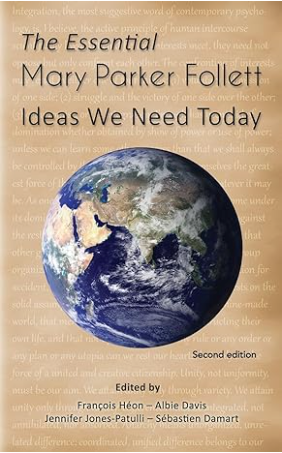Mary Parker Follett: A Voice of Change in a Resistant World
Celebrating a woman ahead of her time.
In the bustling streets of early 20th-century Boston, where intellectual fervor met rigid social norms, Mary Parker Follett navigated a world that was often unready for her progressive ideas. Born in 1868 into an era where women's voices in academia and management were seldom given any chance to be heard, Parker Follett's journey was not just about her own aspirations but a testament to her unyielding belief in the power of collective wisdom and more democratic leadership.
Living just a stone's throw away from Harvard, Parker Follett faced the impenetrable barriers of gender norms. Harvard, a bastion of higher education and intellectual discourse, was an exclusive domain for men. *This, however, did not deter Parker Follett. With the city as her classroom and its diverse inhabitants as her teachers, she immersed herself in the world of ideas and management practices.
Her days were often spent in the shadows of Harvard's libraries and lecture halls, where she engaged in discussions with peers who had access to these hallowed spaces. These interactions, though informal, were rich in intellectual exchange and sparked in Parker Follett a desire to challenge the status quo of organizational management and societal leadership.
Leadership Power Dynamics
Parker Follett's frustrations with the system were not only personal; they were deeply intertwined with her observations of the prevailing power dynamics in organizations and society. In a world dominated by "power-over" structures, where leadership was equated with control and authority, Parker Follett envisioned a different paradigm. She saw "power-with" as the essence of true leadership – a collaborative approach where power was not wielded over others but exercised with them through interaction and cooperation.
Her revolutionary ideas about leadership were born from her keen observation of everyday interactions and conflicts. Parker Follett believed that conflict was not a destructive force but a creative one if approached constructively. She advocated for resolving conflicts through integration rather than domination or compromise. This approach sought solutions that met the interests of all parties involved, a principle that would later become a cornerstone in modern conflict resolution and negotiation practices.
Parker Follett's insight into the dynamics of group behavior and organizational structure was equally pioneering. She perceived organizations not as static entities defined by rigid hierarchies but as living systems characterized by complex human interactions. This perspective led her to emphasize the importance of holistic approaches in management, considering the organization as an integrated whole where changes in one part would invariably impact the others.
Despite the brilliance of her ideas, Parker Follett's path was laden with challenges. In a society where women were expected to remain on the peripheries of academic and professional arenas, her contributions were often overlooked or undervalued. Yet, she persevered, driven by an unwavering commitment to her beliefs and an innate ability to see beyond the constraints of her time.
Amplifying Parker Follett’s Voice
Parker Follett's writings and lectures slowly began to resonate with a broader audience. She wrote extensively, pouring her groundbreaking ideas into articles, books, and speeches. Her work on management as a profession, emphasizing ethical standards and specialized training, laid the groundwork for modern management education.
Parker Follett's legacy is a narrative of resilience, intellect, and vision. Her ideas on democratic leadership, conflict resolution, and the power of collective endeavor were not only ahead of her time but also remarkably relevant to contemporary management practices. Despite being confined by the rigid structures of her era, Parker Follett broke through barriers with the strength of her ideas, leaving an indelible mark on the world of organizational theory and practice.
In the end, Parker Follett's story is not just about the struggles and triumphs of a woman in a male-dominated society. It is about the enduring power of ideas and the impact of a visionary mind that dared to challenge, rethink, and transform the way we understand leadership and organizations even today.
The Agile Leadership Journey not only celebrates Parker Follett’s life and work, but continues to carry her voice into the generations to come. So while women have made many tremendous strides in the past century to equalize power in society and business, many of her key insights continue to confront all genders. Moving past traditional power over struggles to power with alignment and integration not only helps women to rise, it helps all of us and our organizations to rise.
To learn more, we encourage you to read a collection of her works in the book,
The Essential Mary Parker Follett
edited by François Héon, Albie Davis, Jennifer Jones-Patulli, and Sébastien Damart.
Mary Parker Follett's Education and Work: A Summary
Follett completed her preparatory education at Thayer Academy in the late 1880s. She attended The Society for the Collegiate Instruction of Women (later Radcliffe College) where she focused on government, economics, philosophy, history, and law. She spent a year at Newnham College, Cambridge in 1890 where she studied law, economics, and political science. And later back in Boston, took additional courses at Boston College.
Her professional career started in the early 20th century as a social worker in the Roxbury neighborhood of Boston. She established community centers, focused on juvenile delinquency, and promoted the concept of community centers as a crucial part of social work. Throughout her career, she wrote and spoke on topics related to democracy, social work, and management. Her notable works include The Speaker of the House of Representatives (1896), The New State (1918), and Creative Experience (1924).
In the 1920s and 1930s she became a sought-after consultant and lecturer focusing on organizational behavior and management. She lectured at institutions like the London School of Economics and was a pioneer in developing theories about leadership, conflict resolution, and group dynamics. During this time she contributed her expertise to various organizations and committees, including advising the U.S. President's Committee on Administrative Management.
*Harvard University officially opened its doors to women through the establishment of Radcliffe College, which was initially founded as the "Harvard Annex" in 1879. Radcliffe College was founded by Elizabeth Cary Agassiz and other women to provide women with the opportunity to receive higher education, especially since Harvard College did not admit women at that time. Radcliffe was formally chartered as a college in 1894 and functioned as a female coordinate institution to Harvard, where women could receive instruction from Harvard faculty. A few notable women who later attended Harvard, once open to women, were Hellen Keller, Margaret Mead, and Gertrude Stein.
About the Author
Pete Behrens is a leadership coach and the founder of the Agile Leadership Journey, an organization, curriculum, and community devoted to improving leaders and their organizations. As an engineer by profession, Pete now guides leaders and organizations to be more focused, responsive and resilient to change.
Pete led the development of the Certified Enterprise Coaching (CEC) and Certified Agile Leadership (CAL) programs for the Scrum Alliance, is the creator and host of the (Re)Learning Leadership podcast, and provides leadership and organizational coaching through his company Trail Ridge.
Connect with Pete on LinkedIn.








